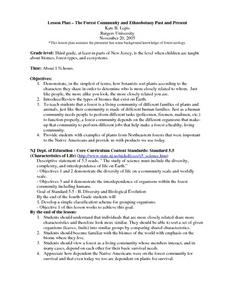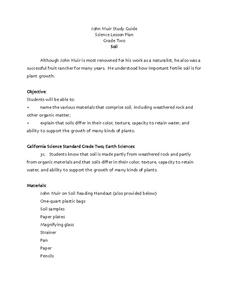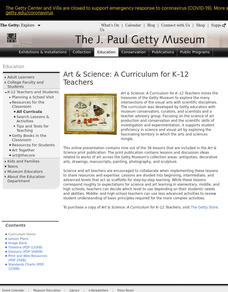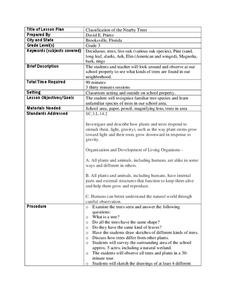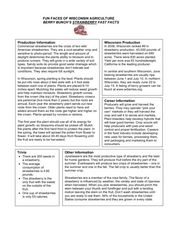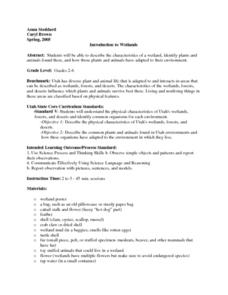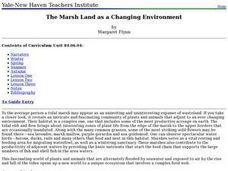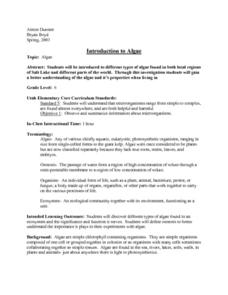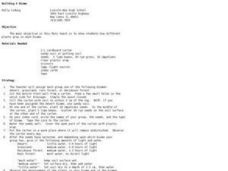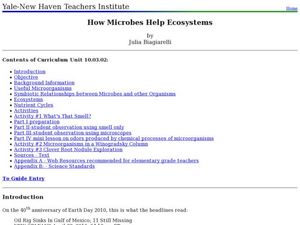Curated OER
Photosynthesis: Using the Sun to Make Food
In this photosynthesis worksheet, students learn how plants use the sun to convert energy into food. They then answer 10 questions using the information they just read. The answers are on the last page.
Curated OER
Mini-Ponds
For this mini pond worksheet, students create a mini-pond ecosystem with soil, water, and plant life. Students let their ecosystem sit for a day and they observe a sample the next day. Students identify all the pond water microorganisms...
Curated OER
The Forest Community And Ethnobotany Past And Present
Students describe a forest as a living community. They determine members interact, and in many cases, depend on each other for their basic survival needs. They investigate how dependent the Native Americans were on the forest...
Curated OER
Biogeochemical Cycles
Students demonstrate comprehension of the energy sources of various cycles by completing mini stories. They demonstrate analysis of words by defining individual word parts and combining them to form definitions. Students demonstrate...
Curated OER
Ecosystem Tumble
Students create visual representations of ecosystems. In this ecology instructional activity, students discuss the interdependence of plants and animals in various ecosystems. Students cut pictures from magazines and glue them on...
Curated OER
Soil
Second graders name the various materials that comprise soil, including weathered rock and other organic matter. They explain that soils differ in their color, texture, capacity to retain water, and ability to support the growth of many...
Curated OER
Clearly Classified
Young scholars review the classification system for living organisms and apply it the classification of insects and flowers in the still life by Ambrosius Bosschaert. They create a chart classifying the animals and plants in the painting...
Curated OER
Classification of the Nearby Trees
Third graders practice using classification techniques to identify local trees. In this plant life instructional activity, 3rd graders discuss how trees differ from other plants and what characteristics are unique to trees alone....
Curated OER
Fun Faces of Wisconsin Agriculture: Berry Bunch's Strawberry Fast Facts
Students use facts about strawberry production in Wisconsin to complete math and art activities. In this strawberry production instructional activity, students read about strawberry production in the state of Wisconsin. They answer math...
Curated OER
Introduction to Wetlands
Students describe the characteristics of a wetland, identify plants and animals found there, and how those plants and animals have adapted to their environment. They visit stations, view a video, and complete a KWL about the wetlands.
Curated OER
Plant Growth
Third graders keep a journal and record the growth of their plant everyday over a two week period. With an observation written down for everyday of the week, they draw a picture of their plant in their journal on Monday and Friday...
Curated OER
Ourselves
Students identify the main parts of the human body. They point to various parts of their own body, cut out pictures of humans and animals and sort them into the two categories, discuss the differences between animals and humans, and...
Curated OER
Deserts
Students do various activities to explain where the United States' desert region lies in relationship to the state in which they live, become familiar with plants and animals in the Sonoran desert, and make a story map of Roadrunner...
Curated OER
Pollination Parties
Students discuss the pollination of bees and butterflies. In this pollination lesson,students complete a worksheet answering questions about an imaginary bee pollination company. Students understand the relationship...
Curated OER
Milkweed and Monarch Butterfly Mania
Students explore Earth science by completing a worksheet in class. In this botany lesson, students identify the relationship between the Milkweed plant and the butterflies which regularly feed on its nutrients. Students visit a list of...
Curated OER
Allelopathy Experiments
Learners explore how allelopathy works in plants. In this botany lesson, students explain how this phenomenon affect other organisms. They read and analyze an article about allelopathy and discuss its flaws.
Curated OER
Unique Ecosystems
Fourth graders explain how in any particular environment, some kinds of
plants and animals survive well, some survive less well, and some cannot survive at all. They research the ecosystem of which each animal or plant is natively a part.
Curated OER
Ecology of the Savanna-Forest Boundaries in Central Brazil
Students explore photosynthesis. In this photosynthesis lesson, students label parts of photosynthesis and take notes. Students conduct experiments on leaves, make observations and record their findings.
Curated OER
The Marsh Land as a Changing Environment
Sixth graders continue their examination of the state of Connecticut. After taking a field trip, they identify the types of birds, plants, invertebrates and vertebrates who make their home in the salt marshes. In groups, they identify...
Curated OER
Introduction to Algae
Students explore different types of algae found in both local regions of Salt Lake and different parts of the world. They discover different types of algae found in an ecosystem and the significance and function it serves.
Curated OER
Building a Biome
Students investigate how plants grow in different biomes. In this biomes lesson plan, students plant sees of impatiens, lima beans and rye seeds in egg cartons. When the plants begin to grow they simulate the assigned biome conditions...
Curated OER
Weave an Aquatic Food Web
Students explore organisms that are part of interconnected food webs. In this food web lesson, students choose an animal and research what the animal eats. Students begin with the food chain and branch out into the...
Curated OER
Wild, Wild Wetland Wildlife
Students investigate biology by participating in a science experiment. In this dissection lesson, students conduct a nature field trip around their school grounds and identify animals, plants, tracks and waste. Students dissect an owl...
Curated OER
How Microbes Help Ecosystems
Sixth graders observe different microorganisms under the microscope. In this biology lesson, 6th graders draw and describe the samples they see. They study the root nodules of plants and explain how the plants benefit from those bacteria.
Other popular searches
- Parts of Plants
- Identifying Parts of Plants
- Parts of Plants Video
- Parts of Plants Organizer
- Reproductive Parts of Plants
- Parts of Plants Cell
- Comparing Parts of Plants
- Parts of Plants Mnemonic
- Edible Parts of Plants
- Comparing Plants Plant Parts
- Parts of a Plants
- Plants Parts for Food


